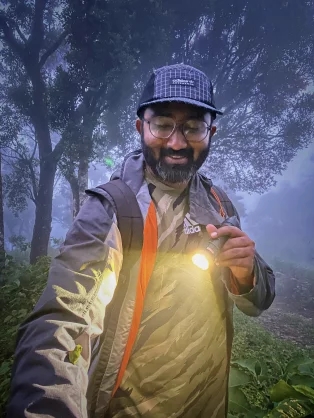WORDS AND PHOTOGRAPHY BYPravin Shanmughanandam

Anaimalai or Anai malai, a name that whispers the essence of its identity, translates literally and poetically to “Elephant Mountains”
Anamala, Anamalai, or Anaimalai – each variation of this name carries the deep resonance of its true custodians: the Asian elephants. These majestic creatures, the most ancient and genuine natives, have roamed and reigned over this extraordinary terrain since time immemorial. They not only inhabit but also shape the very identity of these biodiversity-rich forests. This incredibly biodiverse tract stands as the world’s second-largest contiguous habitat for the Asian elephant population, underscoring its vital significance for biodiversity and the survival of their populations.
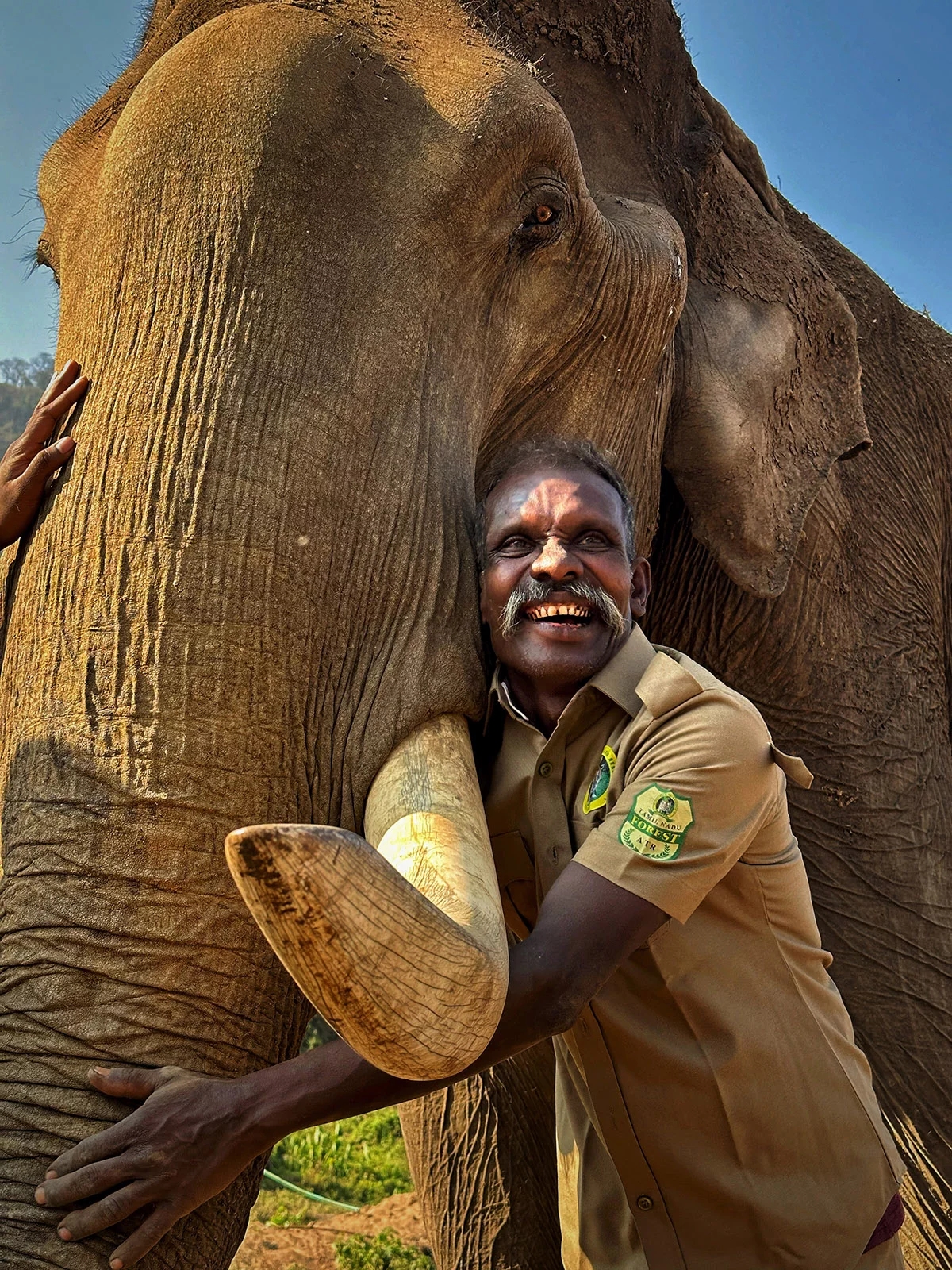
The ancient man-animal bond flourishes here like no other. Living with and caring for the largest mammals on land requires adherence, intelligence, compassion, and ardent fervour to tend to them.
In captive elephant establishments around the world, tools such as bullhooks, sticks, and chains are often deemed essential for taming and managing these majestic creatures. Mahouts and cavadies (colloquial term for assistants to mahouts) traditionally rely on inducing “pain and fear” through these implements to control the elephants. However, a contrasting approach is observed in the Anamalai and Mudumalai regions, where the mahouts embrace positive reinforcement strategies. Here, bathing the elephants, providing treats, feeding them nutritious food, and dedicating quality time to nurture their well-being are pivotal in fostering a bond between the caretakers and the elephants. This method, enriched by the conventional wisdom passed down from ancestors regarding elephant care and management, proves effective in managing these gentle giants without resorting to pain and fear, especially avoiding the use of bullhooks. Add to that the knowledge they’ve gained over the years, becoming attuned to the walks and ways of the elephants, and they live together in close harmony, forming a sacred bond with these gentle giants.
Living alongside them, the stick is wielded but not whipped, the chains are tied but not bound. The bullhooks are possessed but not used. Only an ancient bond is honoured. The tribespeople, who have become caretakers of the abandoned, rescued, or captured elephants that once roamed freely across this ancient land, now play an integral role in the well-being of the elephants. Like family, the caretakers nurture intricate bonds with them – bonds that endure a lifetime and demand unwavering discipline and dedication.
For instance, bathing is one of the most important routines in nurturing the bond between mahout and elephant, which may seem like a simple act. In the wild, the elephants “mud-bathe” or find natural water sources to cool down or play, besides quenching thirst. This bathing ritual is a poignant expression in captivity that signifies their intrinsic bond. Not only does it help the animal calm down and de-stress, but it also enables the mahout to identify wounds or ailments that might otherwise go unnoticed.
I feel blessed to have walked with these men and magnificent creatures in the forests of the Anamalais, my promised land – a place of wonder and inspiration and the forests I deeply love and revere.
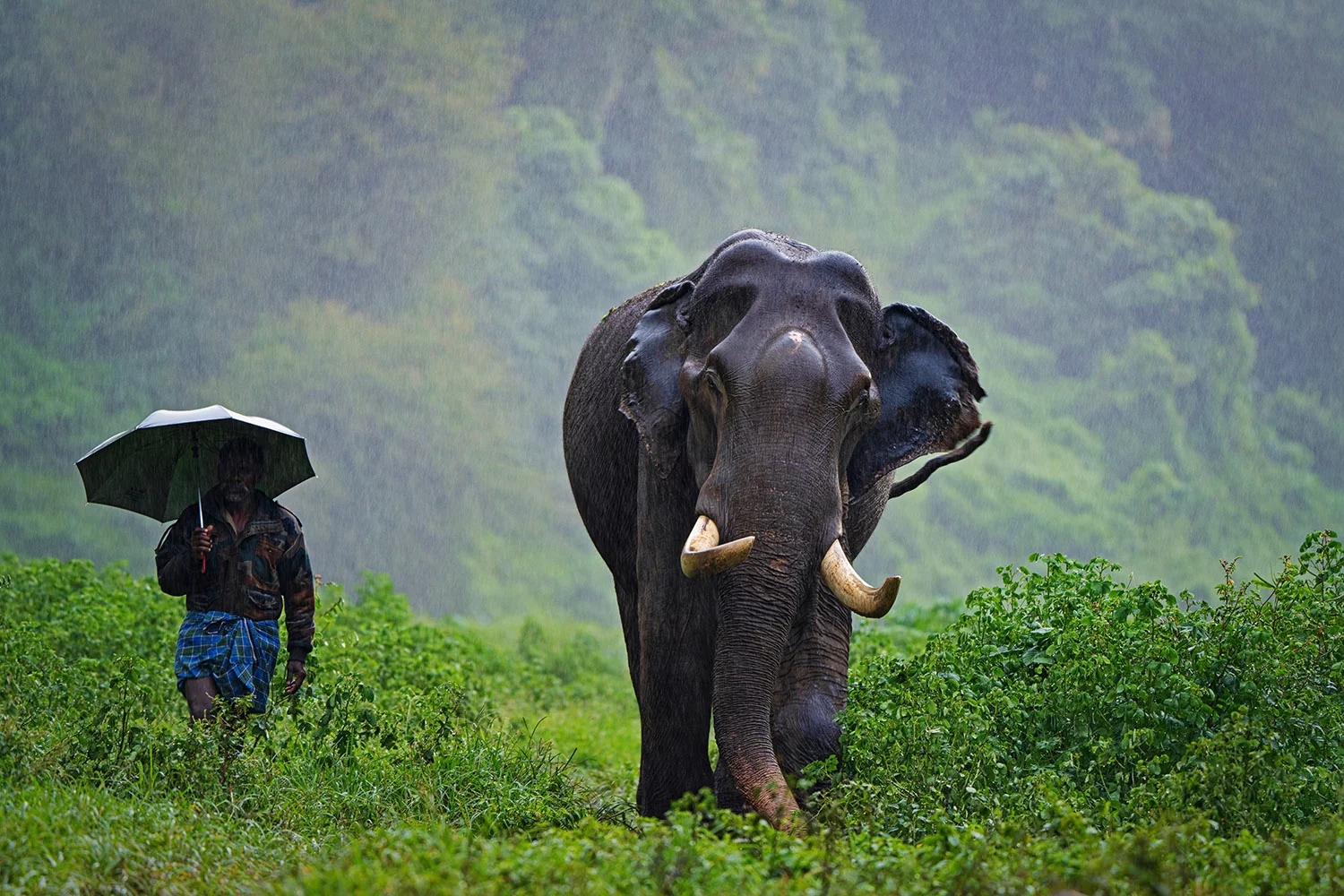
Chandran and his elephant Ramu.

Even on this rainy day, they didn’t miss their routine bath time.
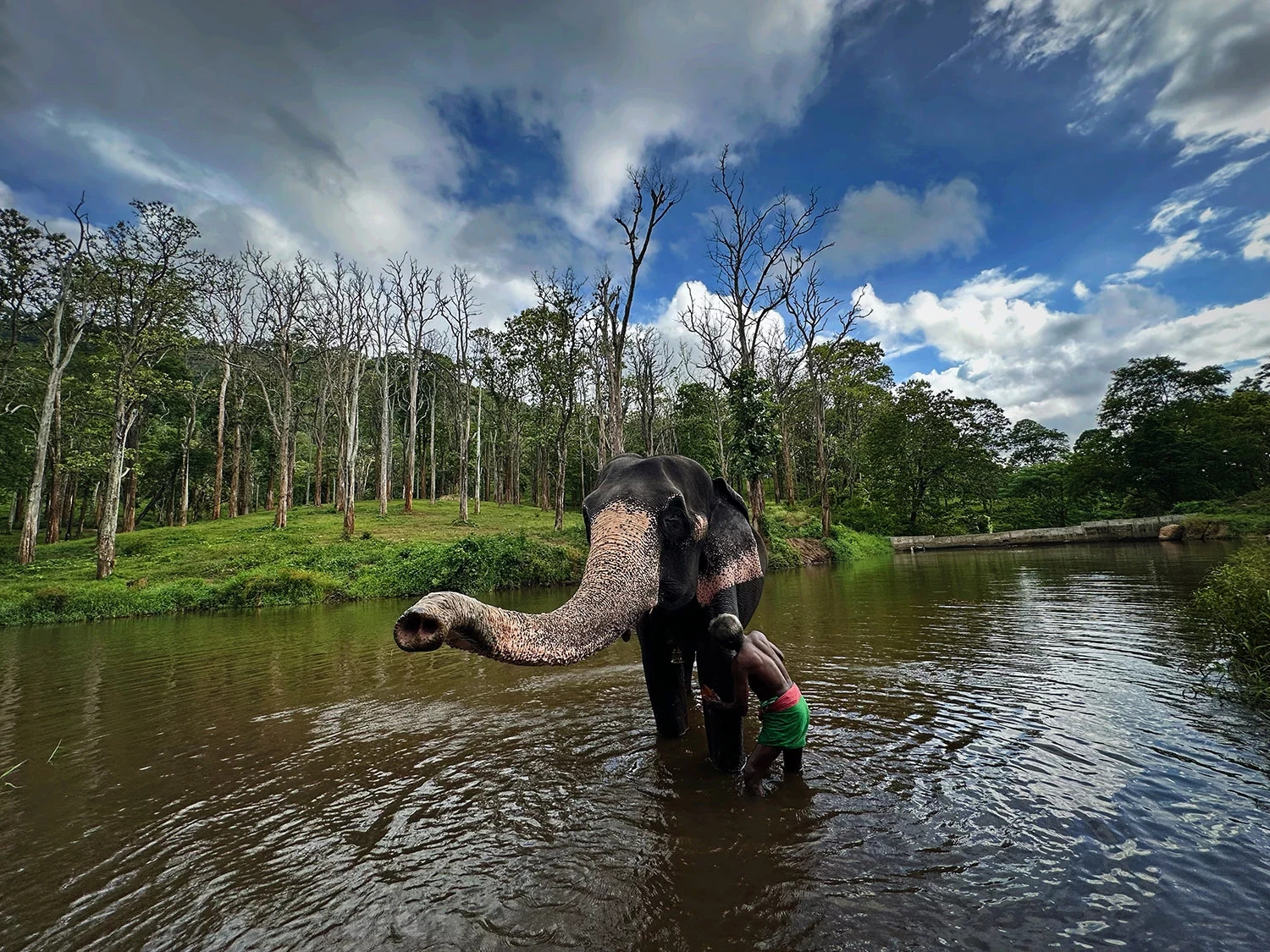
A magical evening from the Kozhikamuthi camp.
At the end of each day, the elephants that roam in the forests are brought down to the river. They are washed and then fed rice balls mixed with jaggery. This routine is never missed, regardless of the weather.

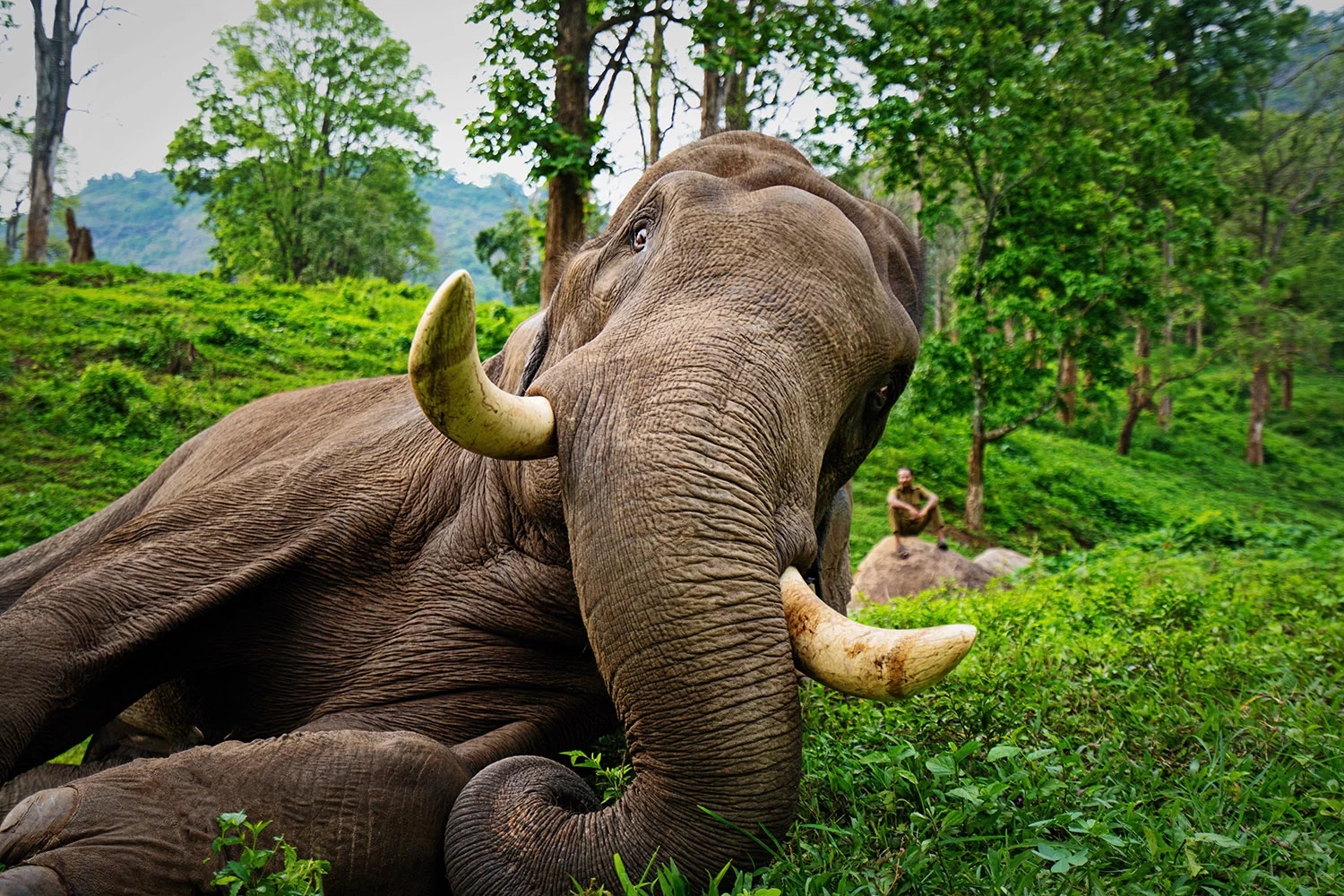
Suyambu and his mahout Suresh.
He stood proudly beneath a tall teak tree, emanating wisdom and majesty. He put his trunk out, recognizing that his master was close. It’s a complex bond that I find perplexing. Although I’m glad that he is well taken care of, cherished, nourished, and looked after, I can’t help but feel a deep sense of sadness. It’s disheartening that he and his kind cannot roam freely like their counterparts. I struggle with conflicting emotions when I visit the captive elephant camp.
I hid behind a tree when I captured these images, pretending not to see his chain-bound legs. The mahout left to fetch some fodder, leaving me alone with him. For those few moments, I was in sheer awe and amazement. For a brief second, his eyes met mine. It felt as if I was in the very presence of the divine Himself.

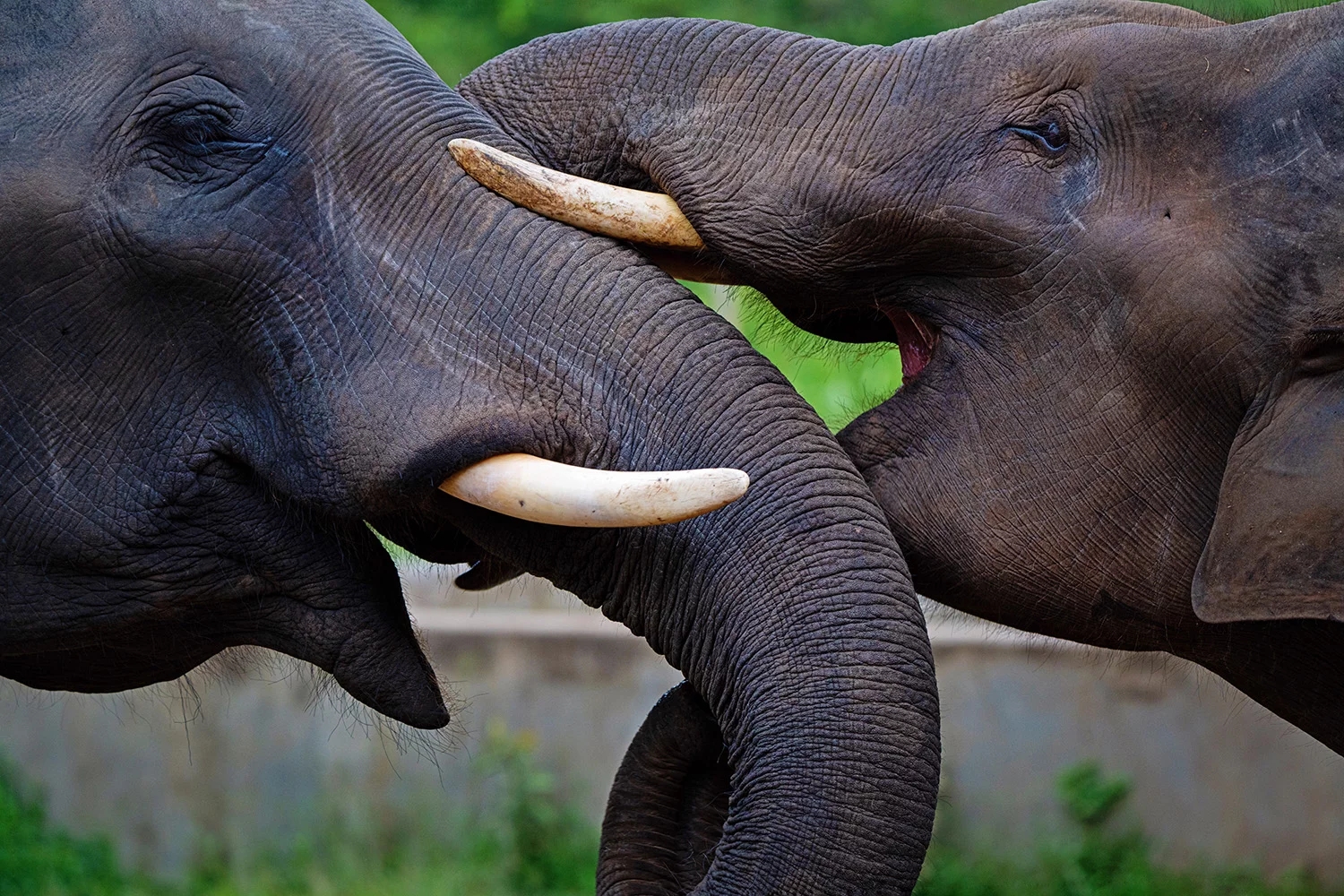
Trunk tussle! Sanjeev and Urigan play fighting.
The youngest camper, Sanjeev, loves hanging out with Urigan as their mahouts let them graze in the forest. Urigan is also social and shares a special bond with other tuskers like Kapil Dev, one of the dominant tuskers at the camp. Urigan is one of the few tuskers whose company is accepted by Kapil Dev. Observing the complex bonds and interactions between different elephants is fascinating and provides insight into their behaviour and social relationships in the wild.
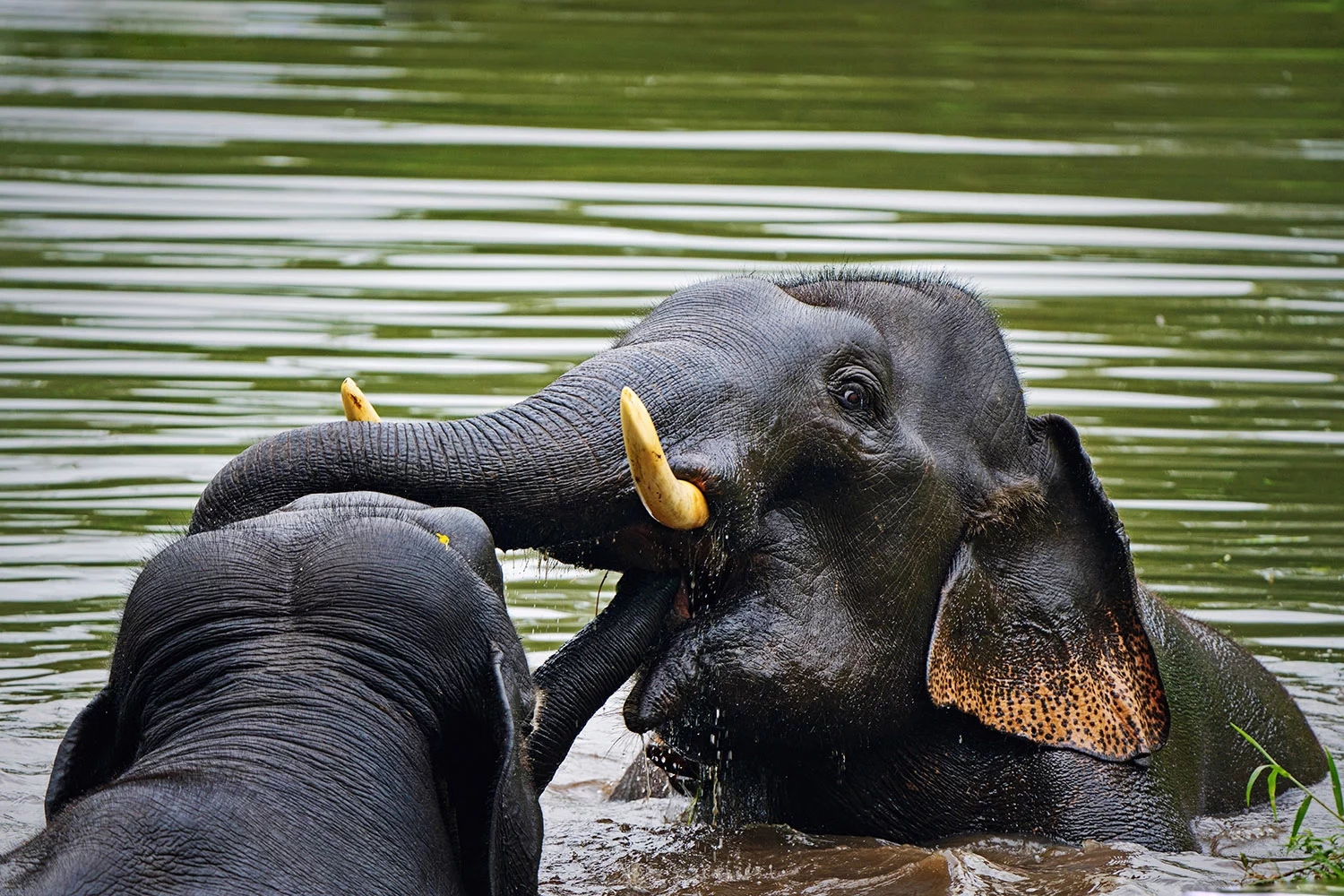
Muthu and Devi playfully fighting during their bath time
Interactions among individuals at the camp greatly reduce stress levels and ensure a healthy lifestyle among elephants. Muthu and Devi are in their prime age, and such interactions may also result in reproduction.
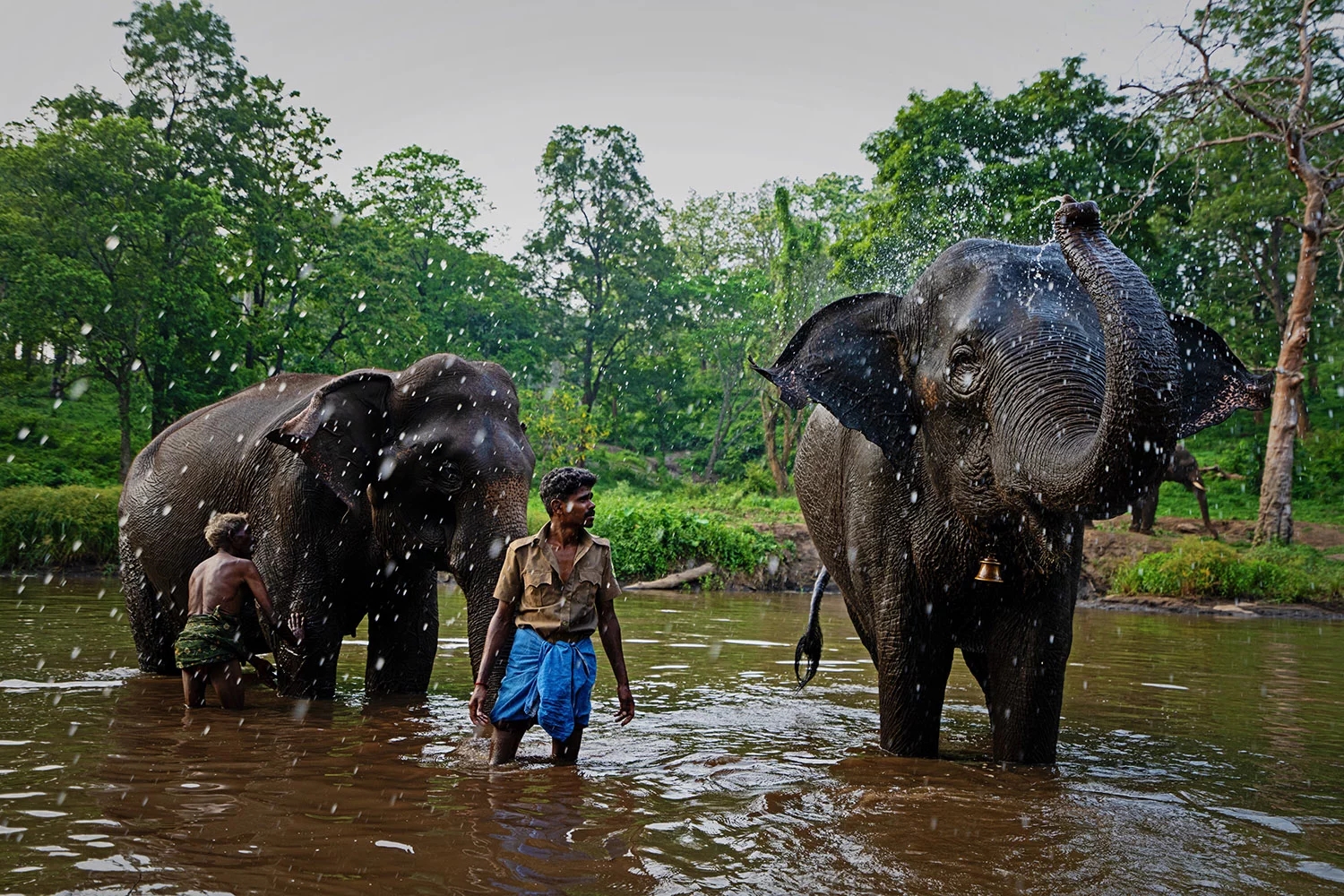
Devi bathing
Devi’s day out in the river!
Devi is one of six elephants caught in Tiruvannamalai for frequently raiding crops. Devi is now one of the gentlest females at the Kozhikamuthi camp. Lately, I’ve found myself drawn to her. Perhaps it’s because she now occupies the same place where my beloved and legendary elephant, Kalpana, once stood. She has become my new favourite.
Devi is one of six elephants caught in Tiruvannamalai for frequently raiding crops. Devi is now one of the gentlest females at the Kozhikamuthi camp. Lately, I’ve found myself drawn to her. Perhaps it’s because she now occupies the same place where my beloved and legendary elephant, Kalpana, once stood. She has become my new favourite.
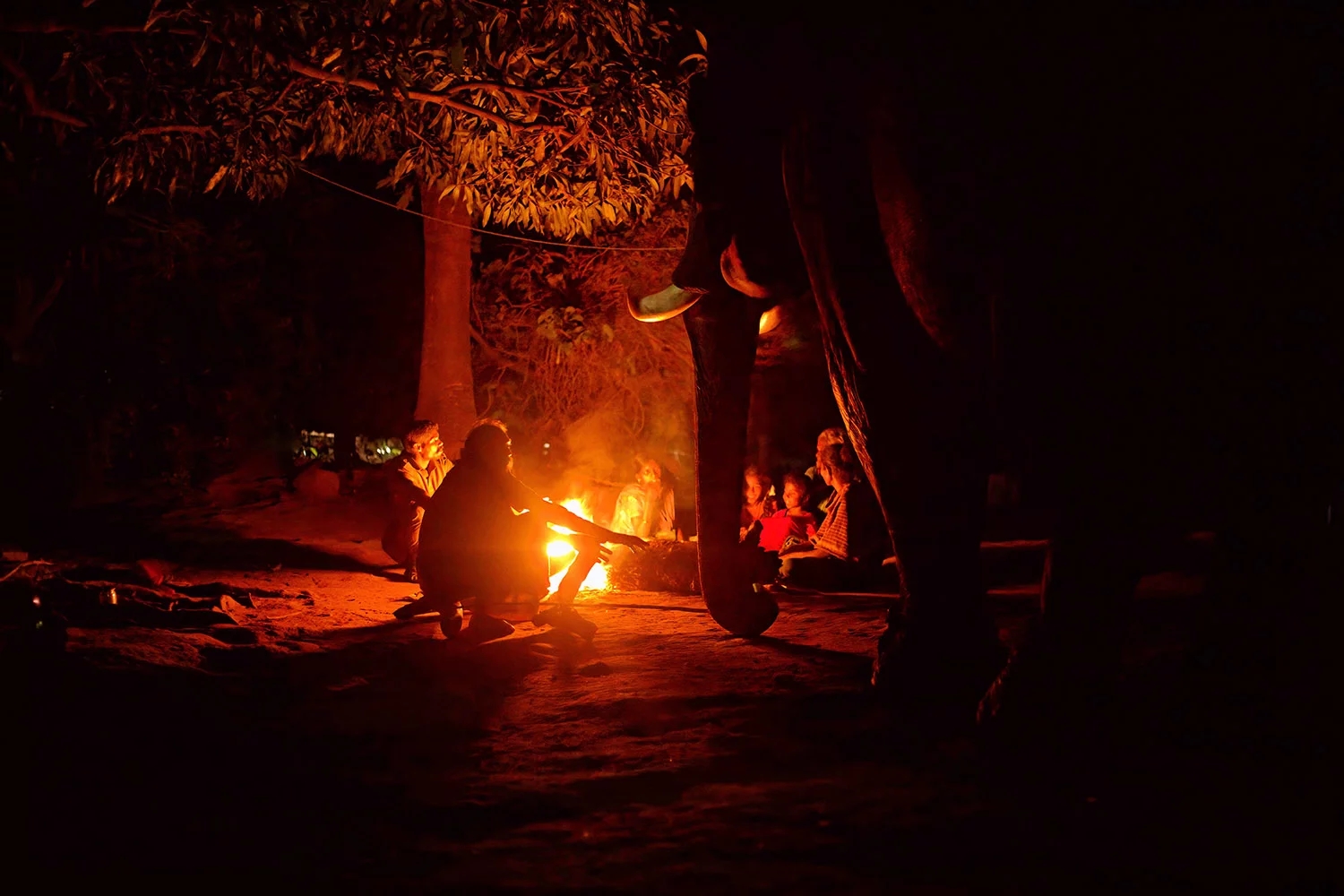
Kaleem
On a chilly December evening, Kaleem’s mahout and the mahout’s family gathered around a kindled fire, sharing warm nuggets and stories. Kaleem stood among them, feeding on the mango leaves, for he is family.


In this scene, a young elephant named Sanjeevi approached the campfire where the mahout’s family had kindled a fire to ward off the cold. He stood there, nudging the mahout’s relative from behind with his trunk. He went to his daughter to grab the brinjals she was cutting for dinner. It was such a light-hearted, mischievous moment! We tried to shoo him away, but he kept coming towards us with his trunk, almost as if he wanted to be part of our gathering.
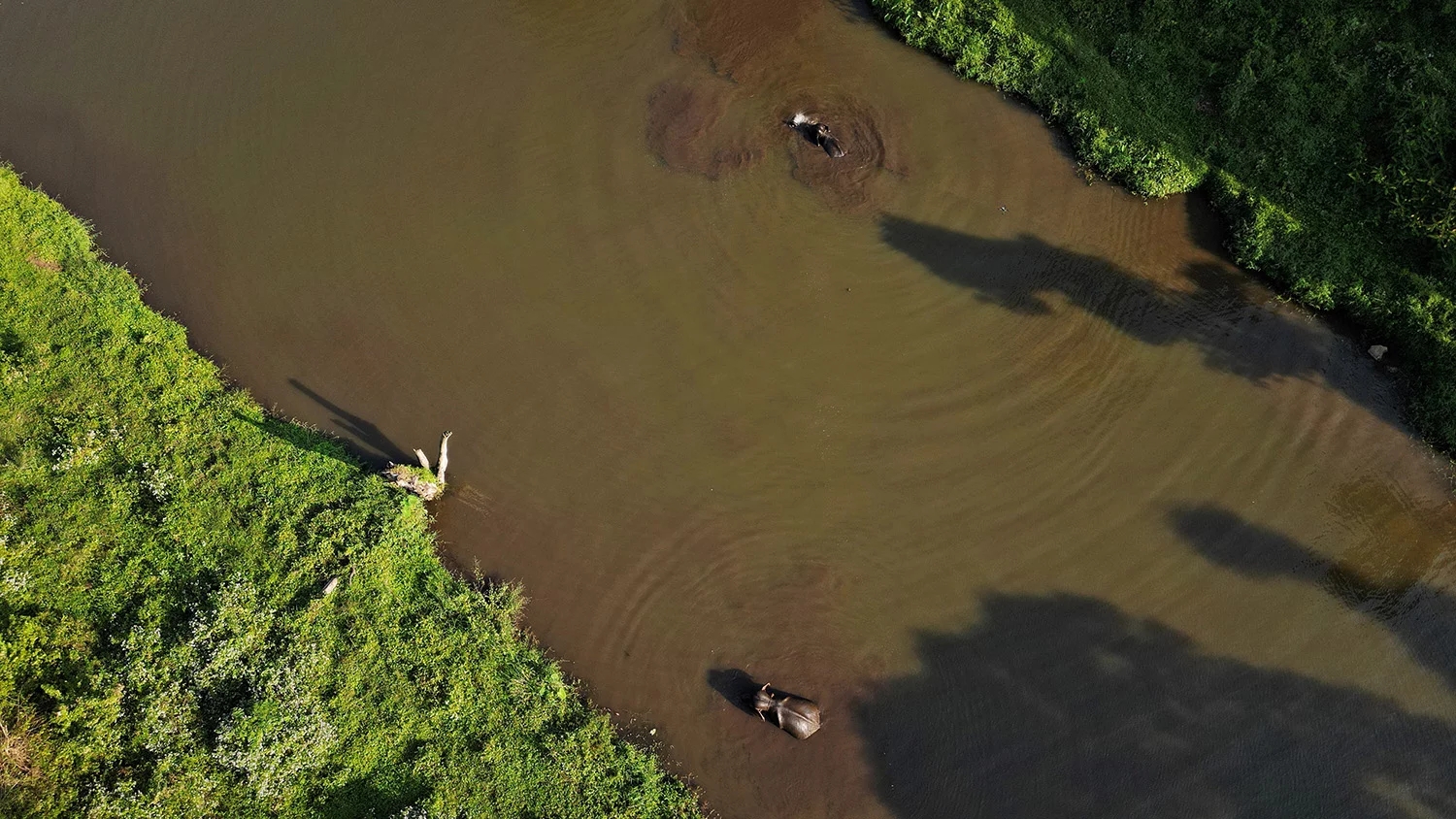
Kaleem and Devi Swimming
Kaleem and Devi swim freely in the stream that flows through the camp. Practices like these and providing surroundings closer to their natural environment help these gentle giants stay stress-free and lead calm lives.
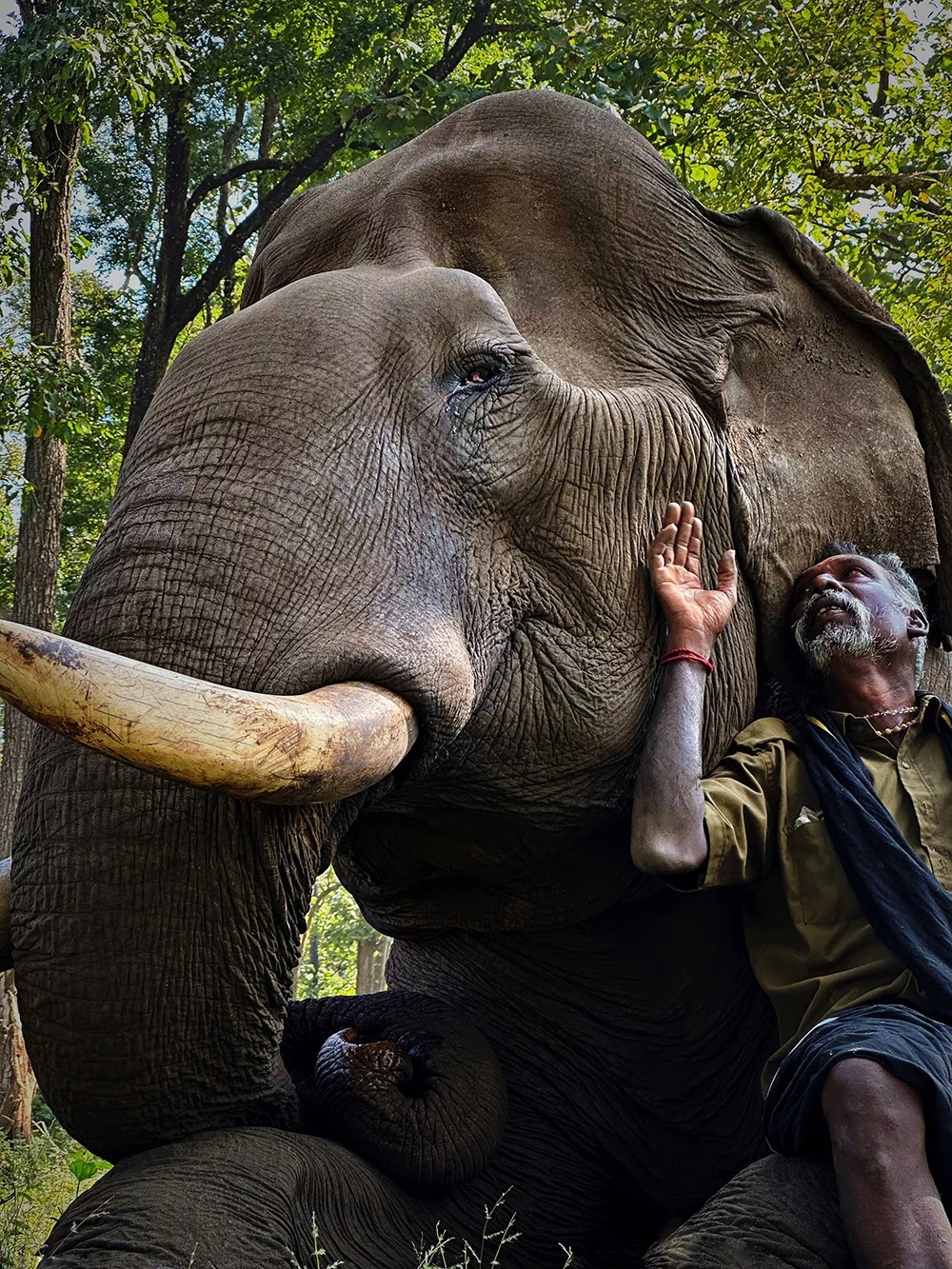
Mani and Kaleem
With over 100 successful operations in India, Kaleem is possibly the most celebrated Kumki. He is trusted for his capture and drive expertise across various states like Tamil Nadu, Bihar, Assam, and Kanyakumari. Mani and Kaleem have stood by each other through thick and thin, like brothers. Come rain or shine, they were always there when the department needed them, especially during difficult times when only they could accomplish the job. Now, they lead a peaceful, retired life. Whether they are in captivity, under the care of our loving mahouts, or roaming free in the wild and cared for by the vast expanse of nature, these magnificent beings play a crucial role in maintaining the beauty of our forest lands. Without them, the world would not be the awe-inspiring place it is.

